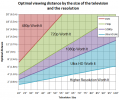ok, here is my situation: I have the Mini 2 and am enjoying it quite a bit. Enough that I expect I will be getting either the Mini 3 or the Air 2S at some future date
* I have a 40" Sony Bravia TV that is HD 1080p. I am mostly in the 'if-it-ain't-broke-don't-fix-it' stage with that TV. It's been operating just fine with great picture quality. And of course, it won't play 4K video thru my Blu-Ray. I have to pull the TV all the way out of the entertainment center to plug into the usb port on the back of the TV. That's an awkward job
what I have been doing is archiving the 4K video from the Mini 2 after down-converting to 1080p using an app. That usually drops the bitrate from around 100.000kbs to 10,000-12,000 kbs. The videos looked fine on the TV though
but as an experiment, I took a couple of flights and captured video from the Mini 2 in 1080p mode. The bitrate from those videos was about 34,700kbs and looked really good on the TV. Much much better than the down-converted renders
another thing about the TV, is that because of the entertainment center and the size of our living room, even if I did get a new 4K TV it would be no bigger than 43" and we'd still be sitting about 8-10 feet away. That viewing distance makes me wonder just how big a difference our eyes would see between 4K and 1080
so I'm wondering how much quality I'd really be gaining by capturing in 4K over 1080p? and if I'd really notice the difference sometime in the future if/when I make the leap to 4K. Should I keep going thru the effort of archiving the 4K? or be comfortable with 'settling' on 1080?
* I have a 40" Sony Bravia TV that is HD 1080p. I am mostly in the 'if-it-ain't-broke-don't-fix-it' stage with that TV. It's been operating just fine with great picture quality. And of course, it won't play 4K video thru my Blu-Ray. I have to pull the TV all the way out of the entertainment center to plug into the usb port on the back of the TV. That's an awkward job
what I have been doing is archiving the 4K video from the Mini 2 after down-converting to 1080p using an app. That usually drops the bitrate from around 100.000kbs to 10,000-12,000 kbs. The videos looked fine on the TV though
but as an experiment, I took a couple of flights and captured video from the Mini 2 in 1080p mode. The bitrate from those videos was about 34,700kbs and looked really good on the TV. Much much better than the down-converted renders
another thing about the TV, is that because of the entertainment center and the size of our living room, even if I did get a new 4K TV it would be no bigger than 43" and we'd still be sitting about 8-10 feet away. That viewing distance makes me wonder just how big a difference our eyes would see between 4K and 1080
so I'm wondering how much quality I'd really be gaining by capturing in 4K over 1080p? and if I'd really notice the difference sometime in the future if/when I make the leap to 4K. Should I keep going thru the effort of archiving the 4K? or be comfortable with 'settling' on 1080?










